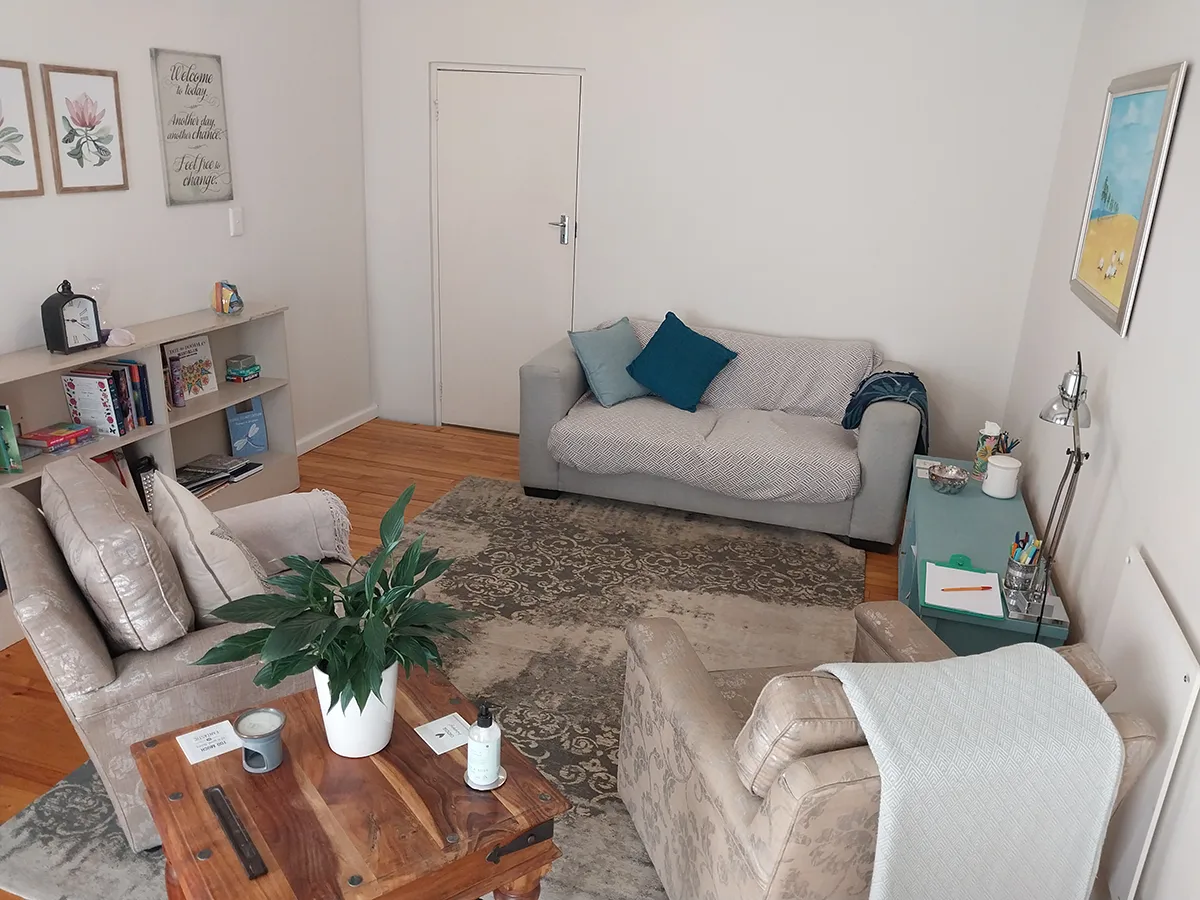Make an Appointment
Get in Touch
Fill out the Appointment Form
Make an Appointment
Complete the form below to arrange your first meet & greet appointment.
Frequently Asked Questions
These terms are often used interchangeably, but it is important to understand some fundamental differences between counselling and psychotherapy. Counselling usually addresses immediate issues in a more direct manner. For example, a client could problem-solve with a Counsellor around stress management and work-life balance. Practical strategies and solutions could be developed. Sometimes this is all a client needs and these services can be helpful and effective, depending on the nature and context of the client.
Whilst practical solutions and short-term issues are also included in psychotherapy, Psychotherapy usually works at a deeper level to explore underlying causes of personal challenges, and to develop more sustainable and lasting positive changes. In the example of work-life balance, psychotherapy might include, for instance, understanding aspects of the client’s personality, relationships, self-concept, and personal strengths and weaknesses; all of which may impact on their approach to and experience of work and life. Improved insight and self-understanding in this regard could assist a client to recognize and regulate barriers to their overall functioning and wellbeing, and to be empowered to continue to live the best version of their life.
The success of psychotherapy is influenced by many factors, such as: the relationship developed by the Psychologist and client; the client’s outlook; the client’s commitment to therapeutic work and personal responsibility taken to bring about positive change; and in the case of minors, support and consistency from family members. No Psychologist can give a guarantee that therapy will be successful, and it is definitely not a “quick fix”. Due to the personal nature of the work, it is vital to find a good fit between you and your therapist.
In addition, there are many different “approaches” to psychotherapy (based on the core beliefs / ways of understanding life and the psyche), and each approach comes with an array of techniques. Some Psychologists and Registered Counsellors specialise in and practise a particular approach only; for instance, you may have come across “CBT” (Cognitive-Behavioural Therapy) or “Psychodynamic” therapists. Many practitioners work in an “eclectic” or “integrative” way; that is, they draw from several approaches and apply various techniques, or select techniques that are best suited to the client.
I adopt a holistic and integrative approach to Psychotherapy. That is, I draw on a range of techniques and models of the human mind and human experience. As an experienced integrative Psychologist and therapist, I have a wide range of skills and competencies that I select from in order to best meet the needs of each individual client and their particular circumstances. In addition, every client brings their own unique input to the therapeutic process.
Thus it also becomes a collaborative experience as we generate the journey together. The aim of psychotherapy is always to support clients wherever “they are at”; to create a safe and non-judgemental space in which to receive support and engage in personal development; to facilitate healing and constructive, positive, sustainable personal growth; and to empower clients to live more authentic, meaningful and fulfilling lives.
A Registered Counsellor has completed at least a four-year Psychology degree and a 720 hour supervised internship in counselling. Registered Counsellors cannot make diagnoses, and must refer more complex cases to Psychologists.
Professional Psychologists in South Africa have completed a Masters degree in Psychology (5-6 years), one year’s supervised internship post, and a published Master’s dissertation (research study). Clinical Psychologists also complete one year of community service. Psychologists conduct psychotherapy, assessments, and wider systemic interventions, at times.
Ultimately, every Psychology professional registered with the HPCSA is ethically responsible to work within their particular areas of skill, expertise, and competencies, which are determined by their training, supervision and experience. This applies to Registered Counsellors and all categories of Psychologists (e.g. Educational Psychologists, Clinical Psychologists, Counselling Psychologists, Neuropsychologists etc.)
The Health Professions Council of South Africa. www.hpcsa.co.za
The HPCSA, together with the 12 Professional Boards under its ambit, is established to provide for control over the education, training, and registration for practicing of health professions registered under the Health Professions Act. To protect the public and guide the professions, Council ensures that practitioners uphold and maintain professional and ethical standards within the health professions.
Once qualified, a psychological practitioner will receive a registration number from the HPCSA, which indicates that the person has met all the qualification criteria and has a license to practice.
My HPCSA Registration Number is: PS0108847

Both Psychiatrists and Psychologists are trained in the diagnosis, treatment, and prevention of mental health, emotional, and behavioural issues. Psychologists work with these issues primarily through regular psychotherapy sessions with clients, and wider interventions when needed.
Psychiatrists attended medical school and are qualified doctors, who then completed additional training to specialise in mental health. Psychiatrists assess both the mental and physical aspects of psychological difficulties, and prescribe medication for treatment.
Psychologists cannot prescribe medication and will refer to a Psychiatrist or GP specialising in mental health, when required.
Some Psychiatrists are trained in and conduct psychotherapy with their patients.
YES!
Well… they should or should have at some point during their training, at the least. As Psychologists are generally invested in matters of mental health and personal growth, it follows that most would have experienced their own therapeutic process, and may still continue with their own psychotherapy and/or some form of personal growth work.
Newly qualified Psychologists should also attend regular ‘supervision’ with a more senior and experienced Psychologist, during their early years of practice. Supervision is when cases are discussed with colleagues in order to improve understanding, skills, and best professional practice. All Psychologists may consult with other Psychologists from time to time for supervision on cases; these discussions remain confidential and serve to support the practitioners in their professional learning and development.
YES!
“Whether one is rich or poor, educated or illiterate, religious or non-believing, man or woman, black, white, or brown, we are all the same. Physically, emotionally, and mentally, we are all equal. We all share basic needs for food, shelter, safety, and love. We all aspire to happiness and we all shun suffering. Each of us has hopes, worries, fears, and dreams. Each of us wants the best for our family and loved ones. We all experience pain when we suffer loss and joy when we achieve what we seek. On this fundamental level, religion, ethnicity, culture, and language make no difference.”
~ Dalai Lama
I have a good understanding of French and Afrikaans, and some understanding of Italian and German. Whilst you are welcome to speak to me in these languages, a fair amount of English will need to be included and I conduct sessions in English.
Regular psychotherapy sessions are usually scheduled for approximately 50 minutes. At my discretion, it may be extended to a full hour.
Some appointments need to be booked for longer (e.g. assessments; assessment intake interviews; assessment feedback sessions; couple sessions; some individual therapy sessions as needed).
Please respect the time boundaries of your appointment. The few minutes between sessions are vital for effective administration and human breaks!
I work predominantly in-person.
Should you require online sessions for valid reasons, kindly engage in further discussion with me, and note that an initial in-person meeting is essential (where possible).
A practice number is allocated to a registered Psychologist by the Board of Healthcare Funders. A practice number allows you (the client) to claim for psychological services under the cover of your health insurance / medical aid scheme.
My practice number is: 0352225
You can claim for your appointments from your medical aid scheme, depending on the details of your particular plan and what it covers. However, the practice is not contracted in to medical aid schemes. Thus you will need to pay for your session on the day of the appointment; you will be provided with an invoice that can be submitted to medical aid for reimbursement.
YES – approximately. All medical aid schemes vary slightly in terms of the fees they allocate and cover for Psychologists. For 2025, the average rate across all the medical aid schemes in South Africa for a 50 – 60 minute session with a Psychologist is R1,330.00.
My current rate for a 50 – 60 minute appointment is R1300.00
No, the practice is NOT contracted in to medical aid. You are required to pay for your appointment upfront, and then claim for reimbursement from your medical aid scheme with the invoice provided.
Approximately 6 hours with the person being assessed.
Assessments also require an intake interview (usually with the parents) and a comprehensive feedback discussion. Thus, a total of 8 – 9 in-person hours with the Psychologist.
YES!
“Almost all my middle-aged and elderly acquaintances, including me, feel about 25, unless we haven’t had our coffee, in which case we feel 107.”
~ Martha Beck


